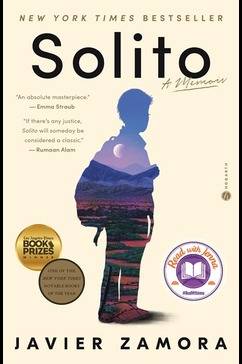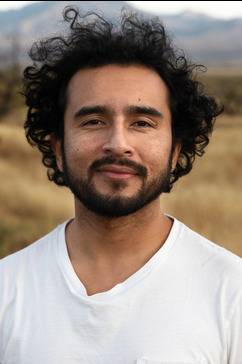Trip. My parents started using that word about a year ago—“one day, you’ll take a trip to be with us. Like an adventure.”

So begins Javier Zamora’s adventure, a 3,000-mile journey from a fishing village in El Salvador through Guatemala and Mexico and across the U.S. border. Solito tells the story of that journey, written in diary form from the perspective of a precocious 9-year-old. It also tells a larger story of lives uprooted by civil war and gang violence, of America’s sometimes cruel border policies, and of strangers willing to risk everything they have to help a child.
If there’s one book in our Fall ’23 series you won’t be able to put down, Solito is it. Javier Zamora’s memoir has all the elements of a Greek epic except, in this case, the hero is a boy too short to ride the roller coaster at Disneyworld.

Born in El Salvador in 1990, in the midst of that country’s brutal civil war, Javier Zamora spent his early childhood living with grandparents and siblings after his parents were forced to flee. In addition to Solito, Mr. Zamora is the author of a collection of poems, Unaccompanied. He has won fellowships from Colgate University, Harvard University, the National Endowment for the Arts, the Poetry Foundation, and the Lannan Literary Foundation, among others. For his work on the Undocupoets campaign, Barnes & Noble awarded him its Writer for Writers prize. He lives in Tucson, Arizona.
When Javier Zamora composed Chapter 4, the scene on the boat, he did it in one big rush—5,000 words in one sitting—and realized afterward that the whole memoir needed to be written that way, in the present tense, from the perspective of his 9-year-old self. In this podcast, he talks not just about the process of writing Solito but about the necessity of writing it.
Play podcast in Chrome or Firefox for best viewing experience.
Join us
Javier Zamora will be at Colgate on Thursday, Sept. 7, 4:30 p.m. EDT. Join us physically in the Persson Hall auditorium or register to join us virtually via Zoom. The in-person audience can participate in a post-reading Q&A and book-signing. Everyone is welcome. Admission is free.
Want to talk about Solito with other thoughtful readers? Join Colgate faculty and students on Monday, Oct. 2, from 7-8 p.m. EDT. for a conversation about all three September Living Writers books. (There’s no need to have read them all in order to participate.) Register here.
Go beyond the book
- In this NPR review, Gabino Iglesias describes Solito as “required reading at a time when immigration is seen as a political talking point instead of as something that affects many lives in very profound ways.”
- “In telling this story from a child’s perspective, describing his surroundings with plainness, presenting his survival without bluster, [Zamora] reveals the true horrors of migration,” writes Karla Cornejo Villavicencio in the New York Times.
- “This place has done so much harm to me,” says Javier Zamora, in this interview with Today’s Jenna Bush Hager. “But now it seems like it’s giving back. It’s apologizing to me.”
- “[O]ur empty bottles rattled and our breath spoke with rust,” writes Javier Zamora in this poem, “Saguaros.”
- Javier Zamora works closely with Salvavision, which fights to provide migrants with basic human rights, and Undocupoets, which promotes the work of currently or previously undocumented poets in the United States.
- This wide-ranging interview between Peter Balakian, the Donald R. and Constance H. Rebar Professor in the Humanities at Colgate, and Javier Zamora probes the point where literature and politics meet.
“Grandpa isn't here to talk to me before falling asleep, to go out for walks and explore the town, and because of that I feel alone, lonely, solo, solito, solito de verdad.”
Solito